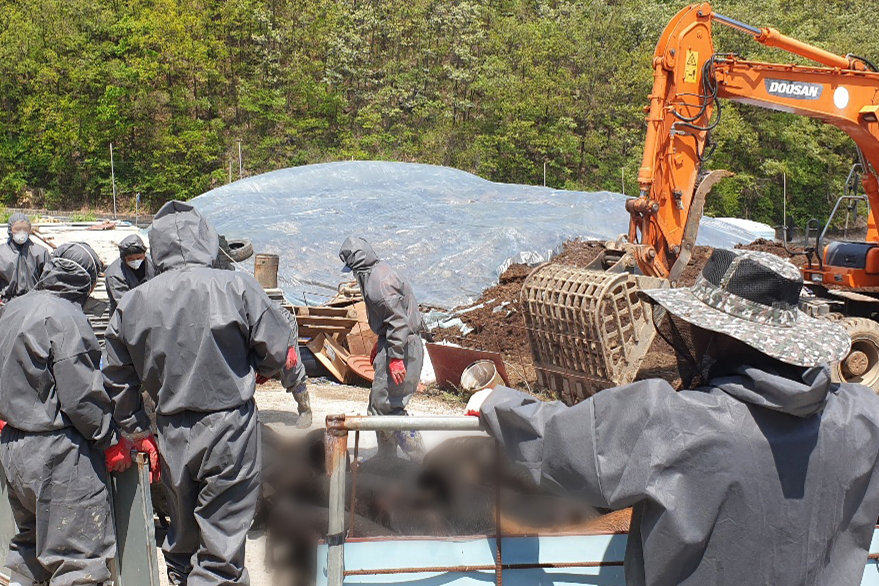 |
Culling efforts are underway Wednesday at a pig farm in Yeongwol-gun, Gangwon Province, where two African swine fever cases were found hours earlier. (Gangwon Province) |
African swine fever has returned to South Korean farms after seven months, the Ministry of Agriculture, Food and Rural Affairs said Wednesday, after it confirmed two cases at a farm of 401 pigs in Yeongwol-gun, Gangwon Province. All domesticated pigs at the farm were culled immediately.
A total of 11 African swine fever cases have been discovered from wild boars in Yeongwol-gun since the outbreak started in 2019. The pig farm is just 1.2 kilometers away from where the last case in the county was discovered in a wild boar.
The ministry said officials imposed a 48-hour standstill order until 11 a.m. Friday on livestock-related facilities in Gangwon Province, Gyeonggi Province and North Chungcheong Province, the three main provinces where cases have been discovered.
Authorities said African swine fever tests returned negative for other pig farms in the 10-kilometer radius of where the latest case among pig farms was found. It is at the moment conducting detailed testing and analyses at 170 more farms in 19 nearby cities and counties.
Officials vowed to heighten virus control measures to contain the virus from spreading, as the outbreak could disturb the supply and demand of pork items sold and distributed throughout the country while threatening the livelihoods of local pig farmers.
“It is unfortunate to discover another African swine fever case despite our concentrated quarantine efforts,” said acting Prime Minister Hong Nam-ki in a meeting Wednesday.
“All measures must be preemptively and boldly made, and I ask related ministries to concentrate all of their resources to actively cooperate in controlling the outbreak.”
The Ministry of Environment and the Ministry of Agriculture, Food and Rural Affairs are at work to install more fences to prevent movement of wild boars while dispatching more vehicles to carry out disinfection efforts.
The news is especially concerning as the latest case from Yeongwol-gun is the first time in seven months that authorities have confirmed the deadly disease from domesticated pigs. The last case was found on Oct. 9, 2020.
The swine fever, for which no vaccine exists, has a fatality rate of nearly 100 percent for infected animals. It passes by direct contact as well as through infected animal feed and on clothing and farm equipment, although is harmless to humans.
Since the outbreak started in South Korea in September 2019, South Korea has culled more than 450,000 farmed pigs throughout the country and hundreds of wild boars.
It was only late last year that pig farmers that saw their pigs culled for virus reasons were able to bring pigs back to their farms, and only six months have passed since they were allowed to restart their businesses.
In most cases, it takes anywhere between a full year and 16 months for pig farms to start turning a profit after buying their first pigs, and before making their first net profit, many of them rely on debt, which has heavily surged since African swine fever landed in Korea.
According to the Korea Pork Producers Association, pig farms affected by the deadly swine virus have an average of 1.1 billion won ($977,000) in outstanding debt. Pig farms also have had to pay to maintain empty barns and provide monthly salaries for workers even when their pigs were culled.
While the government provided some relief funds when culling the pigs, the vast majority of pig farmers affected by the virus are facing deep financial woes.
By Ko Jun-tae (
ko.juntae@heraldcorp.com)





![[Weekender] Korea's traditional sauce culture gains global recognition](http://res.heraldm.com/phpwas/restmb_idxmake.php?idx=644&simg=/content/image/2024/11/21/20241121050153_0.jpg)


